#hadoop command
Explore tagged Tumblr posts
Text
Engineers who work for Elon Musk’s SpaceX have been brought on as senior advisers to the acting administrator of the Federal Aviation Administration (FAA), sources tell WIRED.
On Sunday, Sean Duffy, secretary of the Department of Transportation, which oversees the FAA, announced in a post on X that SpaceX engineers would be visiting the Air Traffic Control System Command Center in Virginia to take what he positioned as a tour. “The safety of air travel is a nonpartisan matter,” Musk replied. “SpaceX engineers will help make air travel safer.”
By the time these posts were made, though, according to sources who were granted anonymity because they fear retaliation, SpaceX engineers were already being onboarded at the agency under Schedule A, a special authority that allows government managers to “hire persons with disabilities without requiring them to compete for the job,” according to the Office of Personnel Management (OPM).
These new hires come after the terminations of hundreds of FAA probationary employees, and the most deadly month of US aviation disasters in more than a decade.
According to a source with knowledge of the situation, none of the SpaceX engineers were fully vetted by their start date. Unlike the very young technologists associated with Musk’s so-called Department of Government Efficiency (DOGE) who have been given access to critical systems at agencies ranging from OPM and the Treasury Department to the National Oceanic and Atmospheric Administration in recent weeks, though, the engineers identified by WIRED—Ted Malaska, Thomas Kiernan, Sam Smeal, and Brady Glantz—do appear to have experience relevant to the FAA.
Malaska is currently, according to his LinkedIn profile, a senior director of application software at SpaceX, where he started working in May 2021. Formerly the senior director of data engineering at Capitol One and a senior architect at FINRA, he graduated from the University of Maryland Baltimore County in 2000 and cowrote a 2015 book on Hadoop application architectures.
Kiernan is currently a lead software engineer at SpaceX, according to his LinkedIn page. Before joining SpaceX in May 2020, he worked at Wayfair and is a 2017 Dartmouth graduate.
Smeal is a software engineer who has worked at SpaceX since September 2021, according to his LinkedIn. He graduated from Saint Vincent College in 2018.
Glantz is a software engineer who has worked at SpaceX since May 2024 and worked as an engineering analyst at Goldman Sachs from 2019 to 2021, according to his LinkedIn, and graduated from the University of Michigan in 2019.
Malaska, Kiernan, Smeal, and Glantz did not immediately respond to requests for comment. The FAA also did not immediately respond to requests for comment.
In his post on X, Duffy wrote, "Because I know the media (and Hillary Clinton) will claim Elon’s team is getting special access, let me make clear that the @FAANews regularly gives tours of the command center to both media and companies.”
But on Wednesday, FAA acting administrator Chris Rocheleau wrote in an email to FAA staff, viewed by WIRED, that DOGE and the teams of special government employees deployed in federal agencies were “top-of-mind,” before noting that the agency had "recently welcomed” a team of special government employees who had already toured some FAA facilities. “We are asking for their help to engineer solutions while we keep the airspace open and safe,” he wrote, adding that the new employees had already visited the FAA Command Center and Potomac TRACON, a facility that controls the airspace around and provides air traffic control services to airports in the DC, Maryland, and Virginia areas.
In a Department of Transportation all-hands meeting late last week, Duffy responded to a question about DOGE's role in national airspace matters, and without explicitly mentioning the new employees, suggested help was needed on reforming Notice to Air Mission (NOTAM) alerts, a critical system that distributes real-time data and warnings to pilots but which has had significant outages, one as recently as this month. “If I can get ideas from really smart engineers on how we can fix it, I’m going to take those ideas,” he said, according to a recording of the meeting reviewed by WIRED. “Great engineers” might also work on airspace issues, he said.
SpaceX functioned as the pre-inauguration staging ground for the DOGE team, according to reporting from The New York Times and sources who spoke to WIRED. In the months between November 5 and January 20, members of DOGE including Steve Davis (president of Musk’s Boring Company) and the young engineer Luke Farritor were operating out of the company’s DC office, according to a source with knowledge.
The company did not respond to questions about whether these employees will retain their salaries and positions at the company during their time with DOGE. Many of the so-called department’s operatives have joined as “special government employees,” who are limited to working 130 days in a year. Last week WIRED reported that Tom Krause, a DOGE operative at the Treasury Department, would continue to maintain his position as CEO of the Cloud Software Group while also performing the duties of fiscal assistant secretary. Other members of Musk’s companies, including xAI and Tesla, have also taken on positions with DOGE.
Late last week, the Trump administration laid off 400 FAA workers, according to their union, the Professional Aviation Safety Specialists. The union says these included probationary employees who worked on air traffic control communications and related radio and computer systems. Air traffic controllers were not affected by the layoffs, Duffy said in an X post.
Just two weeks before that, the US suffered its most deadly aviation incident in more than a decade, when 67 people died after an Army helicopter collided with a passenger jet in Washington, DC. Though initial findings suggest complex equipment and communications issues possibly played roles in the disaster, President Trump was quick to blame “DEI,” railing against a decade-old program that helps the FAA identify talent among populations with disabilities. People with disabilities hired into the FAA and other federal agencies are often accepted under the Schedule A authority—exactly the route these new engineers have taken into the agency.
The FAA has frequently tangled with Musk’s SpaceX, as the rocket company and others fight to operate their own interests in crowded American airspace. In January, the FAA temporarily grounded SpaceX’s program after one of its Starship rockets broke apart midflight, reportedly damaging public property on Turks and Caicos in the Caribbean. The FAA diverted dozens of commercial airline flights following the explosion and announced an investigation into the incident, which is ongoing and being led by SpaceX. Musk, however, characterized the failure as “barely a bump in the road” and did not seem to indicate that the investigation would slow SpaceX’s launch cadence. Last year, the company indicated it was aiming for 25 launches of the Starship in 2025.
FAA spokesperson Steven Kulm told WIRED that “the FAA is overseeing the SpaceX-led mishap investigation.” The FAA did not respond to further questions about whether the presence of SpaceX engineers at the agency would constitute a conflict of interest.
In September, the FAA proposed $633,000 in fines following two 2023 incidents in which SpaceX allegedly did not follow its license requirements, violating regulations. Responding to an X user posting about the penalties, Musk wrote, “The fundamental problem is that humanity will forever be confined to Earth unless there is radical reform at the FAA!” Shortly afterward, Musk called for FAA head Mike Whitaker to resign.
In January, more than three years before his term was due to end, Whitaker did resign.
“I told Elon, any conflicts, you can’t have anything to do with that,” said President Trump in a press conference this week, in response to a question about Musk, SpaceX, the FAA, and conflicts of interest. “So anything to do with possibly even space, we won’t let Elon partake in that.”
The White House did not immediately respond to a request for comment.
SpaceX is directly regulated by a small FAA agency called the Office of Commercial Space Transportation, which since 1984 has licensed the launch of US space rockets. “The purpose is to ensure public safety,” says George Nield, a former associate administrator of the office. “People on the ground did not consent” to rocket launches above them, he says. ”We absolutely need to keep them safe. The office has done a great job of that.” The office oversaw 157 launches in 2024 alone.
On February 10, several days after Musk posted on X that DOGE “will aim to make rapid safety upgrades to the air traffic control system,” a group of Democratic legislators wrote to Rocheleau—a career civil servant whose ties to the FAA go back to 1996—requesting information about any planned changes to FAA systems.
“We are extremely concerned that an ad hoc team of individuals lacking any expertise, exposure, certifications, or knowledge of aviation operations being invited, or inserting themselves, to make ‘rapid’ changes to our nation’s air traffic systems,” they wrote. “Aviation safety is not an area to ‘move fast and break things.’”
7 notes
·
View notes
Text
Transform Your Career with Our Big Data Analytics Course: The Future is Now
In today's rapidly evolving technological landscape, the power of data is undeniable. Big data analytics has emerged as a game-changer across industries, revolutionizing the way businesses operate and make informed decisions. By equipping yourself with the right skills and knowledge in this field, you can unlock exciting career opportunities and embark on a path to success. Our comprehensive Big Data Analytics Course is designed to empower you with the expertise needed to thrive in the data-driven world of tomorrow.

Benefits of Our Big Data Analytics Course
Stay Ahead of the Curve
With the ever-increasing amount of data generated each day, organizations seek professionals who can effectively analyze and interpret this wealth of information. By enrolling in our Big Data Analytics Course, you gain a competitive edge by staying ahead of the curve. Learn the latest techniques and tools used in the industry to extract insights from complex datasets, enabling you to make data-driven decisions that propel organizations into the future.
Highly Lucrative Opportunities
The demand for skilled big data professionals continues to skyrocket, creating a vast array of lucrative job opportunities. As more and more companies recognize the value of harnessing their data, they actively seek individuals with the ability to leverage big data analytics for strategic advantages. By completing our course, you position yourself as a sought-after professional capable of commanding an impressive salary and enjoying job security in this rapidly expanding field.
Broaden Your Career Horizon
Big data analytics transcends industry boundaries, making this skillset highly transferrable. By mastering the art of data analysis, you open doors to exciting career prospects in various sectors ranging from finance and healthcare to marketing and e-commerce. The versatility of big data analytics empowers you to shape your career trajectory according to your interests, guaranteeing a vibrant and dynamic professional journey.
Ignite Innovation and Growth
In today's digital age, data is often referred to as the new oil, and for a good reason. The ability to unlock insights from vast amounts of data enables organizations to identify trends, optimize processes, and identify new opportunities for growth. By acquiring proficiency in big data analytics through our course, you become a catalyst for innovation within your organization, driving positive change and propelling businesses towards sustainable success.
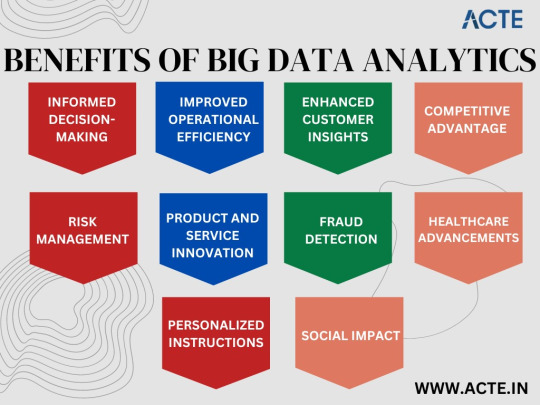
Information Provided by Our Big Data Analytics Course
Advanced Data Analytics Techniques
Our course dives deep into advanced data analytics techniques, equipping you with the knowledge and skills to handle complex datasets. From data preprocessing and data visualization to statistical analysis and predictive modeling, you will gain a comprehensive understanding of the entire data analysis pipeline. Our experienced instructors use practical examples and real-world case studies to ensure you develop proficiency in applying these techniques to solve complex business problems.
Cutting-Edge Tools and Technologies
Staying ahead in the field of big data analytics requires fluency in the latest tools and technologies. Throughout our course, you will work with industry-leading software, such as Apache Hadoop and Spark, Python, R, and SQL, which are widely used for data manipulation, analysis, and visualization. Hands-on exercises and interactive projects provide you with invaluable practical experience, enabling you to confidently apply these tools in real-world scenarios.
Ethical Considerations in Big Data
As the use of big data becomes more prevalent, ethical concerns surrounding privacy, security, and bias arise. Our course dedicates a comprehensive module to explore the ethical considerations in big data analytics. By understanding the impact of your work on individuals and society, you learn how to ensure responsible data handling and adhere to legal and ethical guidelines. By fostering a sense of responsibility, the course empowers you to embrace ethical practices and make a positive contribution to the industry.
Education and Learning Experience
Expert Instructors
Our Big Data Analytics Course is led by accomplished industry experts with a wealth of experience in the field. These instructors possess a deep understanding of big data analytics and leverage their practical knowledge to deliver engaging and insightful lessons. Their guidance and mentorship ensure you receive top-quality education that aligns with industry best practices, optimally preparing you for the challenges and opportunities that lie ahead.
Interactive and Collaborative Learning
We believe in the power of interactive and collaborative learning experiences. Our Big Data Analytics Course fosters a vibrant learning community where you can engage with fellow students, share ideas, and collaborate on projects. Through group discussions, hands-on activities, and peer feedback, you gain a comprehensive understanding of big data analytics while also developing vital teamwork and communication skills essential for success in the professional world.
Flexible Learning Options
We understand that individuals lead busy lives, juggling multiple commitments. That's why our Big Data Analytics Course offers flexible learning options to suit your schedule. Whether you prefer attending live virtual classes or learning at your own pace through recorded lectures, we provide a range of options to accommodate your needs. Our user-friendly online learning platform empowers you to access course material anytime, anywhere, making it convenient for you to balance learning with your other commitments.
The future is now, and big data analytics has the potential to transform your career. By enrolling in our Big Data Analytics Course at ACTE institute, you gain the necessary knowledge and skills to excel in this rapidly evolving field. From the incredible benefits and the wealth of information provided to the exceptional education and learning experience, our course equips you with the tools you need to thrive in the data-driven world of the future. Don't wait - take the leap and embark on an exciting journey towards a successful and fulfilling career in big data analytics.
6 notes
·
View notes
Text
Data Science Training in Ernakulam: A Gateway to a Data-Driven Future
In today's digital-first world, data is more than just numbers—it’s the foundation of innovation, business strategy, and decision-making. From online shopping behavior and social media trends to healthcare diagnostics and financial forecasting, data science is revolutionizing how we interact with the world around us. As companies scramble to gain insights from vast amounts of data, there is an urgent demand for professionals skilled in data analytics, machine learning, and artificial intelligence.
This is where the importance of data science training in Ernakulam comes into play. Ernakulam, being the commercial heart of Kerala and home to a thriving tech ecosystem, offers a fertile ground for aspiring data scientists to learn, grow, and succeed in the fast-evolving tech landscape.
Why Choose Data Science as a Career?
1. Soaring Demand Across Industries
Data science is not confined to IT alone. Industries such as healthcare, retail, finance, logistics, and education are leveraging data science to optimize processes and enhance customer experience. Roles like data analyst, data engineer, and machine learning engineer are among the most in-demand across the globe.
2. Lucrative Salary Packages
A certified data science professional in India can command a starting salary of ₹6–10 LPA, with experienced roles exceeding ₹20 LPA. Global opportunities are also plentiful, offering even more competitive compensation.
3. Multiple Career Roles
Once trained, individuals can branch into various roles including:
Data Scientist
Data Analyst
Business Intelligence Analyst
Machine Learning Engineer
AI Specialist
Data Engineer
Pursuing data science training in Ernakulam equips learners with the versatility to navigate and succeed in these roles.
What Does a Data Science Course Typically Cover?
An effective data science course in Ernakulam should offer a comprehensive blend of theory, technology, and real-world application. Here are the crucial elements:
1. Mathematics and Statistics
Understanding key concepts like probability, statistics, and linear algebra is essential for interpreting data, identifying patterns, and building algorithms.
2. Programming with Python
Python is the most commonly used language in data science. You’ll learn:
Data manipulation (Pandas, NumPy)
Visualization (Matplotlib, Seaborn)
Machine learning (Scikit-Learn, TensorFlow, PyTorch)
3. Data Wrangling and Cleaning
Raw data is rarely usable. Training covers how to clean, transform, and prepare datasets for analysis.
4. Machine Learning Algorithms
From linear regression and decision trees to support vector machines and neural networks, a solid course includes both theoretical understanding and hands-on implementation of algorithms.
5. Deep Learning and AI
Advanced topics include:
Neural Networks
Computer Vision
Natural Language Processing
Reinforcement Learning
6. Big Data and Cloud Platforms
Familiarity with tools like Hadoop, Spark, and cloud services (AWS, GCP, Azure) can significantly enhance your employability.
7. Capstone Projects
Courses that offer live, industry-relevant projects allow students to apply their learning to solve real problems—this is crucial for building a job-ready portfolio.
Why Ernakulam is Emerging as a Data Science Learning Hub
1. Tech-Friendly Infrastructure
Home to Infopark and SmartCity Kochi, Ernakulam houses several IT firms and startups that actively seek skilled data science professionals.
2. Access to Quality Education
With a rich academic background and a culture of learning, Ernakulam has become a go-to destination for technical training.
3. Cost-Effective Learning
Compared to other major metros like Bangalore or Mumbai, Ernakulam offers top-tier training at more affordable prices—without compromising quality.
4. Growing Community and Networking Opportunities
Ernakulam hosts tech events, meetups, and workshops where students and professionals connect, collaborate, and stay updated with the latest industry trends.
Choosing the right data science institution in Ernakulam not only puts you in the center of Kerala’s tech boom but also provides the connections and exposure needed to launch a strong career.
Choosing the Right Data Science Training in Ernakulam
When selecting a training institute, keep these in mind:
Experienced Faculty: Trainers with real-world industry experience make a significant difference.
Updated Curriculum: The tech world evolves rapidly. Ensure the course includes current tools and technologies.
Hands-On Learning: A theory-heavy course without practical experience won’t cut it. Look for projects, case studies, and assignments.
Placement Support: Resume workshops, mock interviews, and job referrals add value to your training.
Flexibility: Institutes that offer online or hybrid modes can help working professionals upskill without disrupting their routine.
Zoople Technologies: Your Best Bet for Data Science Training in Ernakulam
Among the many institutes offering data science education, Zoople Technologies has emerged as a standout choice. Known for its hands-on approach, real-world curriculum, and strong placement support, Zoople is committed to nurturing future-ready data science professionals.
Why Zoople Technologies?
Industry-Aligned Curriculum: Zoople’s data science training in Ernakulam is designed in consultation with industry experts and reflects current job market requirements.
Expert Instructors: Learn from professionals with years of experience working in data science and AI across various sectors.
Practical Training Approach: With real-time projects, case studies, and problem-solving sessions, students gain the kind of practical exposure employers are looking for.
Placement Assistance: Zoople provides robust career support through interview preparation, resume building, and direct job referrals to partner companies.
Modern Infrastructure & Learning Tools: The institute offers state-of-the-art labs and flexible learning modes (classroom, online, weekend batches) to suit all needs.
Alumni Network: Join a growing network of successful professionals who began their journey at Zoople and are now thriving in top firms globally.
Zoople’s goal is not just to teach but to transform—turning curious minds into capable professionals who can confidently step into the workforce and make an impact.
Conclusion
In a world increasingly shaped by data, gaining expertise in data science is no longer optional—it’s essential. As businesses continue to embrace digital transformation, the opportunities for skilled data professionals will only expand.
If you're ready to dive into this high-demand field, investing in quality data science training in Ernakulam is your first step—and choosing the right institute can make all the difference. With its comprehensive curriculum, practical focus, and career-driven approach, Zoople Technologies stands out as the ideal launchpad for your data science journey in Kerala.
1 note
·
View note
Text
What Are the Hadoop Skills to Be Learned?
With the constantly changing nature of big data, Hadoop is among the most essential technologies for processing and storing big datasets. With companies in all sectors gathering more structured and unstructured data, those who have skills in Hadoop are highly sought after. So what exactly does it take to master Hadoop? Though Hadoop is an impressive open-source tool, to master it one needs a combination of technical and analytical capabilities. Whether you are a student looking to pursue a career in big data, a data professional looking to upskill, or someone career transitioning, here's a complete guide to the key skills that you need to learn Hadoop. 1. Familiarity with Big Data Concepts Before we jump into Hadoop, it's helpful to understand the basics of big data. Hadoop was designed specifically to address big data issues, so knowing these issues makes you realize why Hadoop operates the way it does. • Volume, Variety, and Velocity (The 3Vs): Know how data nowadays is huge (volume), is from various sources (variety), and is coming at high speed (velocity). • Structured vs Unstructured Data: Understand the distinction and why Hadoop is particularly suited to handle both. • Limitations of Traditional Systems: Know why traditional relational databases are not equipped to handle big data and how Hadoop addresses that need. This ground level knowledge guarantees that you're not simply picking up tools, but realizing their context and significance.
2. Fundamental Programming Skills Hadoop is not plug-and-play. Though there are tools higher up the stack that layer over some of the complexity, a solid understanding of programming is necessary in order to take advantage of Hadoop. • Java: Hadoop was implemented in Java, and much of its fundamental ecosystem (such as MapReduce) is built on Java APIs. Familiarity with Java is a major plus. • Python: Growing among data scientists, Python can be applied to Hadoop with tools such as Pydoop and MRJob. It's particularly useful when paired with Spark, another big data application commonly used in conjunction with Hadoop. • Shell Scripting: Because Hadoop tends to be used on Linux systems, Bash and shell scripting knowledge is useful for automating jobs, transferring data, and watching processes. Being comfortable with at least one of these languages will go a long way in making Hadoop easier to learn. 3. Familiarity with Linux and Command Line Interface (CLI) Most Hadoop deployments run on Linux servers. If you’re not familiar with Linux, you’ll hit roadblocks early on. • Basic Linux Commands: Navigating the file system, editing files with vi or nano, and managing file permissions are crucial. • Hadoop CLI: Hadoop has a collection of command-line utilities of its own. Commands will need to be used in order to copy files from the local filesystem and HDFS (Hadoop Distributed File System), to start and stop processes, and to observe job execution. A solid comfort level with Linux is not negotiable—it's a foundational skill for any Hadoop student.
4. HDFS Knowledge HDFS is short for Hadoop Distributed File System, and it's the heart of Hadoop. It's designed to hold a great deal of information in a reliable manner across a large number of machines. You need: • Familiarity with the HDFS architecture: NameNode, DataNode, and block allocation. • Understanding of how writing and reading data occur in HDFS. • Understanding of data replication, fault tolerance, and scalability. Understanding how HDFS works makes you confident while performing data work in distributed systems.
5. MapReduce Programming Knowledge MapReduce is Hadoop's original data processing engine. Although newer options such as Apache Spark are currently popular for processing, MapReduce remains a topic worth understanding. • How Map and Reduce Work: Learn about the divide-and-conquer technique where data is processed in two phases—map and reduce. • MapReduce Job Writing: Get experience writing MapReduce programs, preferably in Java or Python. • Performance Tuning: Study job chaining, partitioners, combiners, and optimization techniques. Even if you eventually favor Spark or Hive, studying MapReduce provides you with a strong foundation in distributed data processing.
6. Working with Hadoop Ecosystem Tools Hadoop is not one tool—its an ecosystem. Knowing how all the components interact makes your skills that much better. Some of the big tools to become acquainted with: • Apache Pig: A data flow language that simplifies the development of MapReduce jobs. • Apache Sqoop: Imports relational database data to Hadoop and vice versa. • Apache Flume: Collects and transfers big logs of data into HDFS. • Apache Oozie: A workflow scheduler to orchestrate Hadoop jobs. • Apache Zookeeper: Distributes systems. Each of these provides useful functionality and makes Hadoop more useful. 7. Basic Data Analysis and Problem-Solving Skills Learning Hadoop isn't merely technical expertise—it's also problem-solving. • Analytical Thinking: Identify the issue, determine how data can be harnessed to address it, and then determine which Hadoop tools to apply. • Data Cleaning: Understand how to preprocess and clean large datasets before analysis. • Result Interpretation: Understand the output that Hadoop jobs produce. These soft skills are typically what separate a decent Hadoop user from a great one.
8. Learning Cluster Management and Cloud Platforms Although most learn Hadoop locally using pseudo-distributed mode or sandbox VMs, production Hadoop runs on clusters—either on-premises or in the cloud. • Cluster Management Tools: Familiarize yourself with tools such as Apache Ambari and Cloudera Manager. • Cloud Platforms: Learn how Hadoop runs on AWS (through EMR), Google Cloud, or Azure HDInsight. It is crucial to know how to set up, monitor, and debug clusters for production-level deployments. 9. Willingness to Learn and Curiosity Last but not least, you will require curiosity. The Hadoop ecosystem is large and dynamic. New tools, enhancements, and applications are developed regularly. • Monitor big data communities and forums. • Participate in open-source projects or contributions. • Keep abreast of tutorials and documentation. Your attitude and willingness to play around will largely be the distinguishing factor in terms of how well and quickly you learn Hadoop. Conclusion Hadoop opens the door to the world of big data. Learning it, although intimidating initially, can be made easy when you break it down into sets of skills—such as programming, Linux, HDFS, SQL, and problem-solving. While acquiring these skills, not only will you learn Hadoop, but also the confidence in creating scalable and intelligent data solutions. Whether you're creating data pipelines, log analysis, or designing large-scale systems, learning Hadoop gives you access to a whole universe of possibilities in the current data-driven age. Arm yourself with these key skills and begin your Hadoop journey today.
Website: https://www.icertglobal.com/course/bigdata-and-hadoop-certification-training/Classroom/60/3044
0 notes
Text
The Essential Tools Every Data Analyst Must Know
The role of a data analyst requires a strong command of various tools and technologies to efficiently collect, clean, analyze, and visualize data. These tools help transform raw data into actionable insights that drive business decisions. Whether you’re just starting your journey as a data analyst or looking to refine your skills, understanding the essential tools will give you a competitive edge in the field from the best Data Analytics Online Training.

SQL – The Backbone of Data Analysis
Structured Query Language (SQL) is one of the most fundamental tools for data analysts. It allows professionals to interact with databases, extract relevant data, and manipulate large datasets efficiently. Since most organizations store their data in relational databases like MySQL, PostgreSQL, and Microsoft SQL Server, proficiency in SQL is a must. Analysts use SQL to filter, aggregate, and join datasets, making it easier to conduct in-depth analysis.
Excel – The Classic Data Analysis Tool
Microsoft Excel remains a powerful tool for data analysis, despite the rise of more advanced technologies. With its built-in formulas, pivot tables, and data visualization features, Excel is widely used for quick data manipulation and reporting. Analysts often use Excel for smaller datasets and preliminary data exploration before transitioning to more complex tools. If you want to learn more about Data Analytics, consider enrolling in an Best Online Training & Placement programs . They often offer certifications, mentorship, and job placement opportunities to support your learning journey.
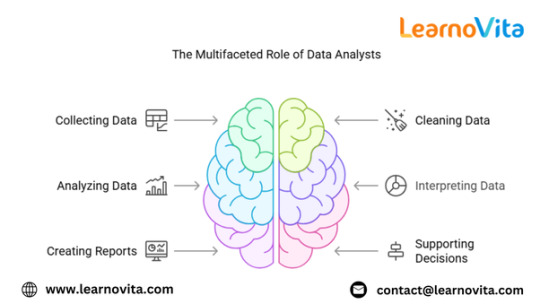
Python and R – The Power of Programming
Python and R are two of the most commonly used programming languages in data analytics. Python, with libraries like Pandas, NumPy, and Matplotlib, is excellent for data manipulation, statistical analysis, and visualization. R is preferred for statistical computing and machine learning tasks, offering packages like ggplot2 and dplyr for data visualization and transformation. Learning either of these languages can significantly enhance an analyst’s ability to work with large datasets and perform advanced analytics.
Tableau and Power BI – Turning Data into Visual Insights
Data visualization is a critical part of analytics, and tools like Tableau and Power BI help analysts create interactive dashboards and reports. Tableau is known for its ease of use and drag-and-drop functionality, while Power BI integrates seamlessly with Microsoft products and allows for automated reporting. These tools enable business leaders to understand trends and patterns through visually appealing charts and graphs.
Google Analytics – Essential for Web Data Analysis
For analysts working in digital marketing and e-commerce, Google Analytics is a crucial tool. It helps track website traffic, user behavior, and conversion rates. Analysts use it to optimize marketing campaigns, measure website performance, and make data-driven decisions to improve user experience.
BigQuery and Hadoop – Handling Big Data
With the increasing volume of data, analysts need tools that can process large datasets efficiently. Google BigQuery and Apache Hadoop are popular choices for handling big data. These tools allow analysts to perform large-scale data analysis and run queries on massive datasets without compromising speed or performance.
Jupyter Notebooks – The Data Analyst’s Playground
Jupyter Notebooks provide an interactive environment for coding, data exploration, and visualization. Data analysts use it to write and execute Python or R scripts, document their findings, and present results in a structured manner. It’s widely used in data science and analytics projects due to its flexibility and ease of use.
Conclusion
Mastering the essential tools of data analytics is key to becoming a successful data analyst. SQL, Excel, Python, Tableau, and other tools play a vital role in every stage of data analysis, from extraction to visualization. As businesses continue to rely on data for decision-making, proficiency in these tools will open doors to exciting career opportunities in the field of analytics.
0 notes
Text
Why Pursue an M.Tech in Data Science: Career Opportunities and Growth
In a world where everything revolves around technology, data remains the core of decision-making in today's time in practically all spheres. With the rapid expansion of artificial intelligence, machine learning, and big data analytics, professionals skilled in data science are in high demand. If you are considering advancing your career in this dynamic field, an M.Tech in Data Science could be the perfect choice.
Why Choose an M.Tech in Data Science?
Specialized Knowledge and Advanced Skills Unlike short-term certifications or boot camps, an M.Tech in Data Science provides a deep understanding of data analytics, machine learning, and statistical modeling. Gaining knowledge of programming languages such as Python, R, and SQL, you master TensorFlow, Hadoop, and Apache Spark tools.
Interdisciplinary Learning Data science is not limited to IT and software development. It intersects with healthcare, finance, marketing, and even government sectors. An M.Tech program ensures you develop a broad skill set applicable to various industries.
Higher Earning Potential With an advanced degree, professionals can command higher salaries. Data scientists with an M.Tech qualification often earn significantly more than their counterparts with only a bachelor’s degree.
Research and Innovation Many M.Tech programs emphasize research, allowing students to work on innovative projects. This can lead to breakthroughs in AI, automation, and predictive analytics, opening doors to Ph.D. programs or R&D roles.
Career Opportunities After M.Tech in Data Science
Pursuing an M.Tech in Data Science can lead to diverse and lucrative career paths. Some of the most sought-after roles include:
Data Scientist: Analyzes complex data to extract meaningful insights, helping businesses make informed decisions.
Machine Learning Engineer: Develops AI-driven models and algorithms for automation and predictive analytics.
Big Data Engineer: Works with large datasets and cloud computing tools to optimize data processing.
Business Intelligence Analyst: Uses data visualization tools to help organizations interpret trends and patterns.
AI Research Scientist: Engages in cutting-edge AI innovations and contributes to technological advancements.
Future Growth and Industry Demand
All over the world, demand for data scientists is on the rise, with sectors such as finance, healthcare, retail, and manufacturing exemplifying the growth potential of data analytics. The field of data science is projected to grow at 35% over the next ten years, ranking it among the fastest-growing job markets.
Where to Pursue an M.Tech in Data Science?
Making the right choice of institution is critically important if one wants to maximize the chances of career advancement. Universities like Maya University offer comprehensive M.Tech programs in Data Science, equipping students with cutting-edge skills and hands-on experience.
Conclusion
M.Tech in Data Science is a future-proof investment; there is immensity in career growth, a great salary scale, and the chance to work with leading-edge innovations. Whether you are fresh out of graduation or a working professional, this course can open up your path and bring you to the forefront of technological advancement.
So, if you are passionate about data and want to build that with intelligent insights, M.Tech in Data Science is the right step forward!
0 notes
Text
What is the Salary of Data Science Course in Bangalore?
Data Science Course Bangalore
Data Science is one the fastest growing career fields in today's world. The demand for data scientists has increased rapidly as businesses increasingly rely on data-driven decision making. You may wonder what salary you could earn after you complete a Data Science Course In Bangalore. This blog will examine salary trends, factors that affect earnings, and the career growth opportunities available to data science professionals working in Bangalore.

Understanding Data Science Careers
What is Data Science?
Let's begin with an introduction to Data Scientists before we discuss salaries. Data Science is multidisciplinary and combines programming with statistics and domain knowledge in order to derive meaningful insights from data. Data Science involves using machine-learning models and large datasets to create data-driven business solutions.
Why choose data science as a career?
Demand for data scientists
Salary packages that are attractive
Multiple industries are offering opportunities (finances, healthcare, ecommerce, etc.).
Learning and Growth Opportunities
Salary of Data Scientists at Bangalore
Bangalore is also known as India’s Silicon Valley and is home to a number of tech companies, startups, MNCs, etc. Bangalore's data scientists earn some of the highest salaries in the country.
Average Salary Based On Experience
Experience Level
Average Annual Salary in INR
Entry-Level (0-2 years)
Rs6 to Rs8 LPA
Mid-Level (2-5 years)
Rs10 to Rs15 LPA
Senior-Level (5+ years)
Rs20-Rs35 LPA
Freshers can expect to earn a salary of Rs 6-8 LPA after completing a Data Science For Beginners Course.
Professionals with a Data Science Certificate and a few years' experience can earn between Rs 10-15 LPA.
Senior-Level: Data scientists with experience, particularly those who have expertise in Data Science Statistics or machine learning can command salaries up to Rs 20 LPA.
Salary based on job roles
Job Roles
Average Salary in INR
Data Scientist
Rs8 to Rs15 LPA
Data Analyst
Rs5 to Rs10 LPA
Machine Learning Engineer
Rs12 to Rs20 LPA
AI Engineer
Rs15 to Rs30 LPA
Big Data Engineer
Rs10 to Rs18 LPA
Factors affecting Data Science Salaries In Bangalore
Many factors affect the salary of Data Science professionals.
1. Education Background
With a Data Science Certificate and a degree in mathematics, computer science or statistics you can earn a higher wage.
2. Certificates and Training
A Data Science Course from a reputable institute in Bangalore can increase your earning potential. Employers prefer candidates who have certifications from recognized Data Science Certificate programs.
3. Competencies and expertise
Skills that can increase your salary:
Python, R and SQL programming
Deep learning and machine learning
Data visualization (Tableau, Power BI)
Big Data Technologies (Hadoop and Spark)
4. Industry and Company Size
Salary packages vary according to the size and industry of a company. Startups and large tech companies offer lower salaries than MNCs.
5. Location
Bangalore is the city with the highest salary for data scientists in India, thanks to its top-tier tech companies.
Data Science Career Development Kodestree and Future
Data Science Professionals in High Demand
In the next few years, data scientists' demand is expected to increase by 30%. Data science is a major investment for companies in sectors such as healthcare, finance and retail.
The Importance of Continual Learning
Professionals must constantly upgrade their skills to remain competitive. Enrolling in an Online Data Science Course in India allows students to acquire expertise in new technologies, without having to leave their job.
Data Science Programs Offer Opportunities
Data Science Programs are a great way to help professionals.
Experience real-world datasets in a hands-on way
Working on industrial projects
Salary packages and career opportunities to improve
How can I start a career in data science in Bangalore?
Follow these steps to become a Data Scientist:
Learn the basics: Begin with an introduction to data science and core concepts.
Enroll in a course: Attend a Data Science course in Bangalore to learn practical skills.
Earn a certification: Get a Data Science Certificate at a recognized institution.
Build your portfolio by working on projects.
Job Portals and networking platforms are great places to find data science jobs.
Kodestree: Start Your Data Science Career
Kodestree is the perfect choice for those looking for a Data Science Course in Bangalore. The program covers everything from basic to advanced concepts. Kodestree offers expert trainers, real-world projects and placement assistance to ensure you are ready for the job market. Begin your journey to a successful data science career today!
#data science course in Bangalore#data science#data science training#data science program#data science certification
0 notes
Text
ETL Pipeline Performance Tuning: How to Reduce Processing Time
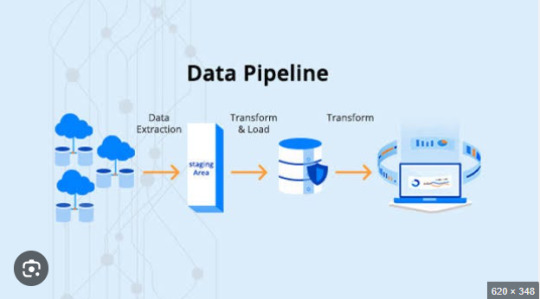
In today’s data-driven world, businesses rely heavily on ETL pipelines to extract, transform, and load large volumes of data efficiently. However, slow ETL processes can lead to delays in reporting, bottlenecks in data analytics, and increased infrastructure costs. Optimizing ETL pipeline performance is crucial for ensuring smooth data workflows, reducing processing time, and improving scalability.
In this article, we’ll explore various ETL pipeline performance tuning techniques to help you enhance speed, efficiency, and reliability in data processing.
1. Optimize Data Extraction
The extraction phase is the first step of the ETL pipeline and involves retrieving data from various sources. Inefficient data extraction can slow down the entire process. Here’s how to optimize it:
a) Extract Only Required Data
Instead of pulling all records, use incremental extraction to fetch only new or modified data.
Implement change data capture (CDC) to track and extract only updated records.
b) Use Efficient Querying Techniques
Optimize SQL queries with proper indexing, partitioning, and WHERE clauses to fetch data faster.
Avoid SELECT * statements; instead, select only required columns.
c) Parallel Data Extraction
If dealing with large datasets, extract data in parallel using multi-threading or distributed processing techniques.
2. Improve Data Transformation Efficiency
The transformation phase is often the most resource-intensive step in an ETL pipeline. Optimizing transformations can significantly reduce processing time.
a) Push Transformations to the Source Database
Offload heavy transformations (aggregations, joins, filtering) to the source database instead of handling them in the ETL process.
Use database-native stored procedures to improve execution speed.
b) Optimize Joins and Aggregations
Reduce the number of JOIN operations by using proper indexing and denormalization.
Use hash joins instead of nested loops for large datasets.
Apply window functions for aggregations instead of multiple group-by queries.
c) Implement Data Partitioning
Partition data horizontally (sharding) to distribute processing load.
Use bucketing and clustering in data warehouses like BigQuery or Snowflake for optimized query performance.
d) Use In-Memory Processing
Utilize in-memory computation engines like Apache Spark instead of disk-based processing to boost transformation speed.
3. Enhance Data Loading Speed
The loading phase in an ETL pipeline can become a bottleneck if not managed efficiently. Here’s how to optimize it:
a) Bulk Loading Instead of Row-by-Row Inserts
Use batch inserts to load data in chunks rather than inserting records individually.
Tools like COPY command in Redshift or LOAD DATA INFILE in MySQL improve bulk loading efficiency.
b) Disable Indexes and Constraints During Load
Temporarily disable foreign keys and indexes before loading large datasets, then re-enable them afterward.
This prevents unnecessary index updates for each insert, reducing load time.
c) Use Parallel Data Loading
Distribute data loading across multiple threads or nodes to reduce execution time.
Use distributed processing frameworks like Hadoop, Spark, or Google BigQuery for massive datasets.
4. Optimize ETL Pipeline Infrastructure
Hardware and infrastructure play a crucial role in ETL pipeline performance. Consider these optimizations:
a) Choose the Right ETL Tool & Framework
Tools like Apache NiFi, Airflow, Talend, and AWS Glue offer different performance capabilities. Select the one that fits your use case.
Use cloud-native ETL solutions (e.g., Snowflake, AWS Glue, Google Dataflow) for auto-scaling and cost optimization.
b) Leverage Distributed Computing
Use distributed processing engines like Apache Spark instead of single-node ETL tools.
Implement horizontal scaling to distribute workloads efficiently.
c) Optimize Storage & Network Performance
Store intermediate results in columnar formats (e.g., Parquet, ORC) instead of row-based formats (CSV, JSON) for better read performance.
Use compression techniques to reduce storage size and improve I/O speed.
Optimize network latency by placing ETL jobs closer to data sources.
5. Implement ETL Monitoring & Performance Tracking
Continuous monitoring helps identify performance issues before they impact business operations. Here’s how:
a) Use ETL Performance Monitoring Tools
Use logging and alerting tools like Prometheus, Grafana, or AWS CloudWatch to monitor ETL jobs.
Set up real-time dashboards to track pipeline execution times and failures.
b) Profile and Optimize Slow Queries
Use EXPLAIN PLAN in SQL databases to analyze query execution plans.
Identify and remove slow queries, redundant processing, and unnecessary transformations.
c) Implement Retry & Error Handling Mechanisms
Use checkpointing to resume ETL jobs from failure points instead of restarting them.
Implement automatic retries for temporary failures like network issues.
Conclusion
Improving ETL pipeline performance requires optimizing data extraction, transformation, and loading processes, along with choosing the right tools and infrastructure. By implementing best practices such as parallel processing, in-memory computing, bulk loading, and query optimization, businesses can significantly reduce ETL processing time and improve data pipeline efficiency.
If you’re dealing with slow ETL jobs, start by identifying bottlenecks, optimizing SQL queries, and leveraging distributed computing frameworks to handle large-scale data processing effectively. By continuously monitoring and fine-tuning your ETL workflows, you ensure faster, more reliable, and scalable data processing—empowering your business with real-time insights and decision-making capabilities.
0 notes
Text
The Essential Skills Required to Become a Data Analyst or a Data Scientist
In today’s data-driven world, businesses require professionals who can extract valuable insights from vast amounts of data. Two of the most sought-after roles in this field are Data Analysts and Data Scientists. While their job functions may differ, both require a strong set of technical and analytical skills. If you want to advance your career at the Data Analytics Training in Bangalore, you need to take a systematic approach and join up for a course that best suits your interests and will greatly expand your learning path. Let’s explore the essential skills needed for each role and how they contribute to success in the data industry.
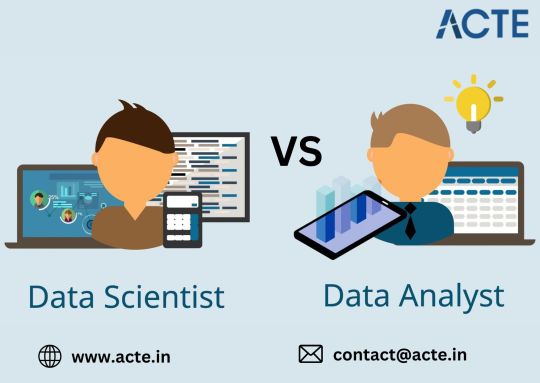
Essential Skills for a Data Analyst
A Data Analyst focuses on interpreting historical data to identify trends, generate reports, and support business decisions. Their role requires strong analytical thinking and proficiency in various tools and techniques. For those looking to excel in Data analytics, Data Analytics Online Course is highly suggested. Look for classes that align with your preferred programming language and learning approach.
Key Skills for a Data Analyst
Data Manipulation & Querying: Proficiency in SQL to extract and manipulate data from databases.
Data Visualization: Ability to use tools like Tableau, Power BI, or Excel to create charts and dashboards.
Statistical Analysis: Understanding of basic statistics to interpret and present data accurately.
Excel Proficiency: Strong command of Excel functions, pivot tables, and formulas for data analysis.
Business Acumen: Ability to align data insights with business goals and decision-making processes.
Communication Skills: Presenting findings clearly to stakeholders through reports and visualizations.
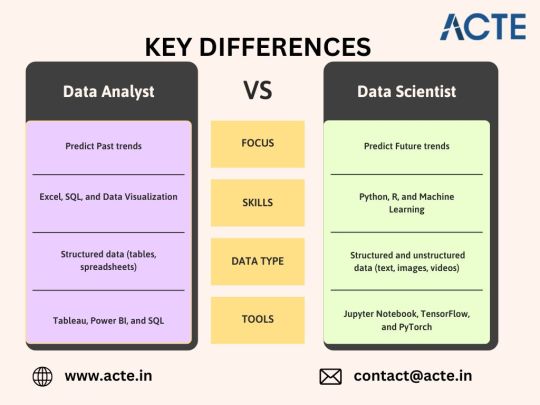
Essential Skills for a Data Scientist
A Data Scientist goes beyond analyzing past trends and focuses on building predictive models and solving complex problems using advanced techniques.
Key Skills for a Data Scientist
Programming Skills: Proficiency in Python or R for data manipulation, modeling, and automation.
Machine Learning & AI: Knowledge of algorithms, libraries (TensorFlow, Scikit-Learn), and deep learning techniques.
Big Data Technologies: Experience with platforms like Hadoop, Spark, and cloud services for handling large datasets.
Data Wrangling: Cleaning, structuring, and preprocessing data for analysis.
Mathematics & Statistics: Strong foundation in probability, linear algebra, and statistical modeling.
Model Deployment & Optimization: Understanding how to deploy machine learning models into production systems.
Comparing Skills: Data Analyst vs. Data Scientist
Focus Area: Data Analysts interpret past data, while Data Scientists build predictive models.
Tools Used: Data Analysts use SQL, Excel, and visualization tools, whereas Data Scientists rely on Python, R, and machine learning frameworks.
Technical Complexity: Data Analysts focus on descriptive statistics, while Data Scientists work with AI and advanced algorithms.
Which Path is Right for You?
If you enjoy working with structured data, creating reports, and helping businesses understand past trends, a Data Analyst role is a great fit.
If you prefer coding, solving complex problems, and leveraging AI for predictive modeling, a Data Scientist career may be the right choice.
Final Thoughts
Both Data Analysts and Data Scientists play crucial roles in leveraging data for business success. Learning the right skills for each role can help you build a strong foundation in the field of data. Whether you start as a Data Analyst or aim for a Data Scientist role, continuous learning and hands-on experience will drive your success in this rapidly growing industry.
0 notes
Text
CSC 4760/6760, DSCI 4760 Big Data Programming Assignment 1
1. (100 points) (Setting up Hadoop on Ubuntu Linux and running the WordCount example) This assignment aims at letting you setup Hadoop on Ubuntu Linux – via the command line. After the installation of Hadoop, you need to run the WordCount example. Source Code and Datasets: The java source code is given in the file “WordCount.java”. You need to run it on two…
0 notes
Text
How Much Do Data Scientists Make in Canada? Salary Insights and Career Growth Tips
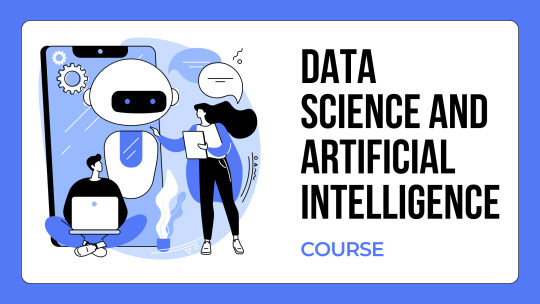
The field of data science has become one of the most lucrative and in-demand career paths in Canada. With businesses relying heavily on big data, artificial intelligence (AI), and machine learning (ML) to make informed decisions, the demand for skilled professionals continues to grow.
If you're considering a career in data science, one of the most pressing questions you may have is: How much do data scientists make in Canada?
This article provides an in-depth look at data scientist salaries, the factors that influence pay, and how the Boston Institute of Analytics' (BIA) Data Science Course Online With Job can help you secure a high-paying role in this field.
What is the Average Salary of a Data Scientist in Canada?
Data science salaries in Canada are among the highest in the tech industry, with professionals earning well above the national average. Here’s a breakdown based on experience:
Entry-Level Data Scientist (0-2 years of experience) → $70,000 – $95,000 per year
Mid-Level Data Scientist (2-5 years of experience) → $90,000 – $120,000 per year
Senior Data Scientist (5+ years of experience) → $120,000 – $160,000 per year
Lead Data Scientist / Manager → $140,000 – $180,000+ per year
These figures come from sources like Glassdoor, Indeed, and PayScale, showcasing that data science is a highly rewarding career path in Canada.
What Influences Data Science Salaries in Canada?
1. Experience and Expertise
As with most professions, experience plays a major role in salary. A beginner might start at $70,000, but as they gain expertise in machine learning, cloud computing, and AI, they can command six-figure salaries.
2. Industry and Sector
Different industries offer different salary ranges. Here are some of the top-paying industries for data scientists in Canada:
Finance & Banking (RBC, TD, Scotiabank) → $90,000 – $150,000
Healthcare & Pharmaceuticals (Ontario Health, Medtronic) → $85,000 – $140,000
E-commerce & Retail (Shopify, Amazon, Walmart Canada) → $80,000 – $130,000
Tech & AI Startups → $85,000 – $160,000
Government & Research Institutions → $75,000 – $120,000
3. Location Matters
Salaries for data scientists vary across Canadian cities. Here’s how they compare:
Toronto → $90,000 – $150,000
Vancouver → $85,000 – $140,000
Montreal → $80,000 – $130,000
Ottawa → $85,000 – $135,000
Calgary → $80,000 – $125,000
Tech hubs like Toronto and Vancouver generally offer higher salaries due to increased demand and a higher cost of living.
4. Skills and Specializations
Data scientists with advanced skills tend to earn more. Some of the most valuable skills include:
Python, R, SQL
Machine Learning & Deep Learning
Big Data Technologies (Hadoop, Spark)
Cloud Platforms (AWS, Azure, Google Cloud)
Data Visualization (Tableau, Power BI)
5. Education and Certifications
While many data scientists have degrees in Computer Science, Mathematics, or Engineering, certifications and specialized training programs can boost earning potential.
One of the best ways to fast-track your career and secure a high-paying job is by enrolling in the Boston Institute of Analytics' (BIA) Data Science Course Online With Job.
How the Boston Institute of Analytics (BIA) Can Help You Secure a High-Paying Data Science Job
The Boston Institute of Analytics (BIA) offers a Data Science Course Online, designed to provide learners with practical skills and job placement support.
Why Choose BIA?
✅ Comprehensive Curriculum – Covers AI, ML, deep learning, and big data ✅ Real-World Projects – Gain hands-on experience with real datasets ✅ Job Placement Assistance – Connect with top employers in Canada ✅ Flexible Online Learning – Study at your own pace from anywhere ✅ Industry-Recognized Certification – Boost your resume and credibility
For professionals looking to break into data science or upskill, this course offers a structured learning path with direct career benefits.
How to Maximize Your Salary as a Data Scientist in Canada
1. Build a Strong Portfolio
Employers prefer candidates with practical experience. To stand out, work on:
Real-world projects
Kaggle competitions
Open-source contributions (GitHub, GitLab)
2. Gain Specialized Skills
Advanced specializations can increase salaries. Consider learning:
Natural Language Processing (NLP)
Computer Vision
Deep Learning
Cloud Computing & MLOps
3. Network with Industry Professionals
Attend AI and data science conferences (AI Toronto, Data Science TO)
Join LinkedIn and GitHub communities
Participate in hackathons and coding challenges
4. Earn Certifications
Certifications from institutions like Boston Institute of Analytics (BIA), Google, AWS, and Microsoft can enhance your job prospects.
5. Apply for High-Paying Roles
Use job portals like:
LinkedIn Jobs
Glassdoor
Indeed Canada
AngelList (for startups)
Final Thoughts
So, how much do data scientists make in Canada? The answer depends on experience, industry, location, and skillset. However, with salaries ranging from $70,000 to $160,000+, data science remains one of the most rewarding and secure careers in Canada.
If you’re looking to enter this field or upskill, the Boston Institute of Analytics' Data Science Course provides a structured, job-focused learning path to help you succeed.
With the right skills, certifications, and networking strategies, you can build a high-paying career in data science and take advantage of Canada’s growing demand for data professionals.
Key Takeaways
✅ Entry-level data scientists earn $70,000 – $95,000, while senior professionals can make $150,000+ ✅ Salaries vary based on location, industry, and expertise ✅ Advanced skills in AI, ML, and cloud computing increase earning potential ✅ Boston Institute of Analytics (BIA) offers a job-focused online data science course ✅ Networking, certifications, and hands-on projects can accelerate career growth
0 notes
Text
Data Science Training in Kerala: Building Future-Ready Careers in a Data-Driven World
In the 21st century, data has emerged as the most valuable asset for businesses across the globe. Every click, swipe, purchase, and search generates a massive amount of information. Companies now depend on skilled professionals who can analyze, interpret, and derive actionable insights from data to maintain a competitive edge. This rising demand has made data science training in Kerala a popular and crucial stepping stone for individuals aiming to secure a thriving career in technology.
Kerala, renowned for its literacy and educational achievements, is rapidly becoming a hub for tech and data science learning. If you aspire to make a mark in this exciting field, understanding the landscape of data science and choosing the right training program is key to your success.
Why Data Science is the Career of the Future
1. Explosive Job Growth
As businesses continue to digitize, the volume of data being generated is growing exponentially. According to LinkedIn and other career platforms, data science roles are among the fastest-growing job categories worldwide. Data analysts, data engineers, and machine learning specialists are in high demand.
2. High Salaries and Career Progression
Data science professionals command some of the highest salaries in the technology sector. In India, an entry-level data scientist can earn anywhere between ₹6–10 LPA, and seasoned professionals easily cross the ₹25 LPA mark. Beyond salary, data science also offers clear paths for career advancement into leadership and strategic roles.
3. Applicability Across Industries
One of the best aspects of pursuing data science training in Kerala is the versatility it offers. Whether it's healthcare, finance, e-commerce, education, or logistics, data science skills are applicable across multiple industries.
Core Components of a Data Science Training Program
A comprehensive best data science training in Kerala should offer a well-rounded curriculum covering technical and soft skills. Here's what you should expect:
1. Mathematical and Statistical Foundations
Understanding the basics of statistics, probability, and linear algebra is crucial for data-driven decision-making and model-building.
2. Programming Skills
Python is the most popular language in data science. Training should cover:
Data manipulation with Pandas and NumPy
Data visualization using Matplotlib and Seaborn
Machine learning libraries like Scikit-Learn, TensorFlow, and PyTorch
3. Data Handling and Preprocessing
Cleaning and preparing data is a critical first step in any data science project. Knowledge of handling missing data, encoding categorical variables, and feature scaling should be emphasized.
4. Machine Learning Algorithms
From regression and classification models to clustering and dimensionality reduction techniques, a strong understanding of machine learning is non-negotiable for aspiring data scientists.
5. Big Data Technologies
Familiarity with big data ecosystems such as Hadoop, Spark, and cloud platforms like AWS, Azure, or Google Cloud can provide a significant advantage.
6. Real-World Projects
Theory is only valuable when applied. A quality training program includes live projects in areas like fraud detection, customer segmentation, recommendation systems, and predictive analytics.
7. Soft Skills and Business Acumen
Understanding the business context and being able to present data-driven insights effectively is as crucial as technical skills. Presentation, storytelling with data, and communication training are essential parts of good data science education.
Why Kerala is a Rising Hub for Data Science Education
Kerala is traditionally known for its commitment to education and innovation. With its increasing focus on IT parks, startups, and entrepreneurship, it is now becoming a promising destination for tech training as well.
IT Infrastructure Growth: Areas like Kochi (Infopark, SmartCity) and Trivandrum (Technopark) are rapidly expanding, hosting numerous tech companies.
Affordable Quality Education: Compared to other metropolitan cities, Kerala offers high-quality education at more reasonable costs.
Skilled Talent Pool: Kerala’s excellent universities and focus on STEM education mean students have a strong foundation to specialize further through courses like data science training in Kerala.
Vibrant Tech Community: Regular tech events, workshops, hackathons, and seminars help students and professionals network and stay updated on industry trends.
What to Look for When Choosing a Data Science Training Program?
When investing time and resources into data science institute in Kerala, consider the following factors:
Expert Trainers: Courses should be taught by experienced professionals, not just theorists.
Updated Curriculum: Data science is evolving rapidly; a good course must reflect current tools, trends, and technologies.
Project Work: Hands-on learning via real-world projects ensures you are job-ready upon completion.
Placement Support: Good institutes provide career guidance, resume reviews, and connections to hiring companies.
Flexible Learning Options: Depending on your schedule, options for online, hybrid, or weekend classes can be extremely beneficial.
Zoople Technologies: Leading the Future of Data Science Training in Kerala
When it comes to world-class data science training in Kerala, Zoople Technologies stands out as a leader. With a mission to bridge the gap between academic knowledge and industry demands, Zoople offers comprehensive and career-focused training that truly transforms learners into professionals.
Why Choose Zoople Technologies?
Industry-Expert Trainers: Learn from mentors who have rich experience in multinational corporations and cutting-edge tech projects.
Comprehensive Curriculum: Zoople’s program covers everything from foundational mathematics to advanced machine learning, AI, and big data technologies.
Project-Based Learning: Students work on live projects, gaining practical experience that employers value.
Strong Placement Assistance: With dedicated career support teams, Zoople helps students with mock interviews, resume preparation, and job placements.
Flexible and Modern Learning: Whether you prefer in-person, hybrid, or online classes, Zoople offers flexible formats tailored to your needs.
Vibrant Alumni Network: Connect with Zoople’s alumni community, many of whom now work with leading tech giants across India and abroad.
Choosing Zoople Technologies for your data science training in Kerala ensures that you are not just learning theoretical concepts but also gaining the practical, hands-on experience required to excel in a competitive job market.
Final Words
Data science is no longer just a buzzword; it is a career-defining opportunity for anyone passionate about technology, analytics, and innovation. As industries become increasingly data-driven, professionals with strong data science skills will be the ones leading change.
If you're serious about launching a successful career in this exciting field, enrolling in a trusted data science training in Kerala program is the first step—and Zoople Technologies is the ideal partner to guide you on that journey.
1 note
·
View note
Text
Big Data Assignment Help: Expert Guidance for Academic Success

Among all the interesting and rapidly developing technologies of our present time, Big Data is something that gathers and processes huge sums of data providing insight for use in various practices. Big Data includes industries such as health, finance, marketing, and artificial intelligence. Complex assignments on Big Data are given to students who study data science, computer science, or business analytics, and they have no clue how to do them unless they get proper guidance. This is where The Tutors Help avails professional aid in making your Big Data assignments easier and more accessible.
What Is Big Data?
Big Data are vast collections of structured and unstructured data that demand sophisticated tools and techniques for handling. The features of Big Data include:
Volume: This is the enormous amount of data generated day and night from different sources, among which social media, sensors, and business transactions stand first.
Velocity: The tremendous rate at which data is being generated and processed.
Variety: Different kinds of data, whether it is text, images, videos, or numbers.
Veracity- The accuracy and reliability of the data in which it is processing.
Value-Informative decisions that can be derived from data.
Hence, it is challenging for the students to grasp these things and implement them in assignments.
What Issues Students Face in Big Data Assignments
Comprehensive Algorithms- An algorithm of big data needs complex analytics and algorithms sometimes which are hard to understand.
Programming Skills – All the assignments needed the proper command of the programming languages such as Python, R, and Java.
Data Processing Tools – There are some softwares that need technical understanding, like Hadoop, Apache Spark, SQL.
Time consuming Analysis- to process and analyze big datasets requires a lot of time and effort.
Lack of Resources – Many students lack quality study materials or tools to complete their assignment.
How The Tutors Help Can Help You
The Tutors Help gives you experienced help that will make your Big Data assignments so easy. Here's why you should choose us:
Experienced Professionals – Our team consists of data science experts who have profound knowledge of Big Data concepts and tools.
Personalized Solutions – All assignments are specially designed according to your needs and course requirements.
Clear Step-by-Step Solution Guidance – Thorough explanations for easy understanding of all the logic we use.
100% Plagiarism Free Work – A product of authentic work and entirely free from copying.
Timely Delivery – Work done before your deadline.
Price-Friendly Help – Expert aid at your student-friendly budget.
How to Get Big Data Assignment Help from The Tutors Help
Getting help from us is easy:
Share the details of your assignment with us, topic, guidelines and deadline.
Get a Quote – we will give you an affordable price for the service.
Let us work for you – our experts will be doing your assignments accurately and rightly.
Review and Learn – apply our solutions towards the better comprehension of Big Data.
Final Words
Big Data is one of the critical subjects with big career opportunities but is challenging while giving assignments. The Tutors Help can offer you professional help to complete assignments efficiently and with high grades.
Don't get stressed out because of Big Data assignments. Turn to The Tutors Help right now and be free from stressful academic support.https://www.thetutorshelp.com/big-data-assignment-help.php
1 note
·
View note
Text
Unlocking Opportunities in a Data-Driven World: Why You Should Master Data Science
In today’s fast-paced digital era, data science has emerged as a game-changing skill across industries. Organizations rely on data scientists to unravel complex datasets, generate actionable insights, and influence critical business decisions. Whether you’re starting from scratch or aiming to refine your expertise, diving into data science can unlock a wealth of career opportunities. Here’s how you can get started with top-notch courses designed for aspiring data scientists.
Why Pursue Data Science?
Data science is an interdisciplinary field that blends programming, statistics, and domain expertise to uncover patterns and insights hidden within data. As businesses generate massive amounts of data daily, professionals with data science expertise are more in demand than ever. Here’s why learning data science could be your next big career move:
High Earning Potential: Data science professionals command competitive salaries and excellent growth prospects.
Versatile Career Options: From data analysts and machine learning engineers to AI specialists and business intelligence experts, the possibilities are vast.
Meaningful Work: Contribute to solving real-world challenges, optimizing business processes, and enhancing customer experiences.
Future-Proof Your Career: With rapid technological advancements, data science remains a cornerstone across industries.
Explore Top Data Science Courses
1. Coursera - Data Science Specialization (Johns Hopkins University)
Overview: A 10-course program covering data cleaning, exploratory analysis, machine learning, and R programming.
Why Choose It: Comprehensive and beginner-friendly with practical projects to showcase your skills.
2. edX - MicroMasters in Data Science (University of California, San Diego)
Overview: Advanced training in Python, machine learning, and big data analytics.
Why Choose It: Ideal for professionals seeking in-depth technical skills and certification.
3. Udemy - Data Science A-Z™: Real-Life Data Science Exercises Included
Overview: A hands-on course emphasizing data preprocessing, visualization, and practical exercises.
Why Choose It: Affordable, flexible, and perfect for quick skill enhancement.
4. Google’s Data Analytics Professional Certificate (Coursera)
Overview: A beginner-friendly program covering tools like Excel, SQL, and Tableau for data analysis and visualization.
Why Choose It: Entry-level certification with industry recognition.
5. Kaggle Learn
Overview: Free, self-paced micro-courses on Python, Pandas, and machine learning.
Why Choose It: Focused on practical coding challenges with flexibility to fit any schedule.
Essential Skills to Master
By enrolling in data science courses, you’ll develop expertise in:
Programming: Learn Python, R, and SQL for effective data handling and analysis.
Statistical Analysis: Interpret data using advanced statistical methods.
Machine Learning: Build predictive models and understand key algorithms.
Data Visualization: Create impactful visuals using Tableau, Power BI, or Matplotlib.
Big Data Tools: Gain hands-on experience with Hadoop, Spark, and other big
#data science#data analytics#data science training#data security#data science course#data science internship
0 notes
Text
Top Skills You Need to Become a Data Scientist in 2025
Data plays a vital role in all industries. Every business owner needs data to stand in this competitive market. Well, let’s learn about data science in depth! Data scientists and their individual careers will be at the highest level of innovation by the year 2025, virtually building wiser businesses, setting profitable technologies, and assisting in creative research to change lives. There’s no need to worry if you are in school or in college, this guide will take you step by step through the most analytic skills that you will need to succeed in this career.

Why Data Science is the Career of the Future
Think of this: modern businesses and organizations are sitting on mountains of data. Every online purchase, social media post, or Netflix recommendation generates data. The heroes who can extract meaningful insights from this data? That's right—data scientists!
As 2025 companies are brushing aside advanced artificial intelligence and predictive modeling, this development will lead to a further increase of quite a significant number in the figures of qualified data scientists. Sectors like finance, health care, education, and entertainment… all are hunting for capable data professionals. Could that be YOU?
But, to become a future-ready data scientist, you'll need a solid foundation. Here's what to focus on.
The Essentials of Data Science
Programming and Scripting Languages
How do you talk to a computer? Easy—with code! Every data scientist needs command over these three languages:
Python: The superstar of programming. Python is flexible, beginner-friendly, and packed with libraries like Pandas (handling data), NumPy (crunching numbers), and Scikit-learn (building machine learning models).
R: Want next-level statistical analysis and eye-catching visualizations? This one's your go-to.
SQL: Data isn't always tucked neatly into spreadsheets—it's living in databases. SQL helps you query, update, and manage that data effortlessly.
How does YouTube know exactly what you want to watch next? Have you ever wondered? That's Python and machine learning in action!

Data Manipulation and Analysis
Every dataset has quirks—missing values, duplicate rows, or even errors. Data scientists clean and prepare this data before drawing insights. This skill is crucial for success.
Tools to master:
Probability & Hypothesis Testing: Assess your data for trends and patterns.
Regression Analysis: Find out how variables interact and predict future outcomes.
Linear Algebra & Calculus: If machine learning excites you, these topics are a must!
🤯 Fun Fact: Did you know machine learning algorithms that teach self-driving cars are steeped in calculus?
with charts turns information into action.
Key tools to explore:
Types of Machine Learning Algorithms:
Top Tools to Master
Hadoop and Spark (for handling big data).
Cloud platforms like AWS, Azure, and Google Cloud (data must be stored somewhere!).
Big data fuels everything from tailored advertising to healthcare advancements.
Soft Skills for Data Scientists
Fact time—data science isn’t only about crunching numbers! Soft skills make all the difference in your success:
Problem-solving & Critical Thinking: Approach challenges with creative, efficient solutions.
Communication: Translate technical details into layman's terms.
Collaboration: Work with diverse teams to tackle projects together.
🤔 Pro tip: Ever explained a machine-learning model to someone who doesn’t know what an algorithm is? Communication wins here!

Practical Skills Using Tools
Textbooks are great, but nothing compares to actual practice. These tools will prep you for real-world challenges:
Raw data doesn’t speak for itself, but visualizations do! Telling stories you for real-world challenges:
MySQL & MS SQL Server: Manage databases efficiently.
Power BI: Design and present actionable reports.
Project Use Cases: Learn data modeling and create polished dashboards through NIPSTec’s curriculum.
Staying Ahead of the Curve
The world of data science evolves daily. To stay current, explore these online resources:
Kaggle Competitions: Solve real-world data problems.
GitHub projects: Collaborate with experts worldwide.
Blogs & Podcasts: Stay updated on tools, trends, and codes.
Start Your Data Science Journey Today
Excited yet? Data science is the ultimate career path filled with endless challenges, opportunities, and creative solutions. It’s where passion meets precision!
And here’s some good news—NIPSTec is here to help. Our Diploma in Data Science and Artificial Intelligence will prepare you with practical knowledge, specialized know-how, and actual work to apply those skills.
🎓 The world of tomorrow will not come into being by itself, yet with the application of your expertise in data science, it might be a bit more optimistic.👉 Enroll today and start shaping the future with data. Contact us now!
1 note
·
View note
Text
What is the cost of a data science course in Bangalore?
Data Science Classes in Bangalore – A Complete Guide
Bangalore, often referred to as the Silicon Valley of India, is a thriving hub for technology and innovation. With the increasing demand for data-driven decision-making across industries, learning Data Science has become a top priority for students and professionals alike. If you are looking for the best Data Science Classes in Bangalore, this guide will provide detailed insights into course structures, costs, career opportunities, and factors to consider when choosing an institute.
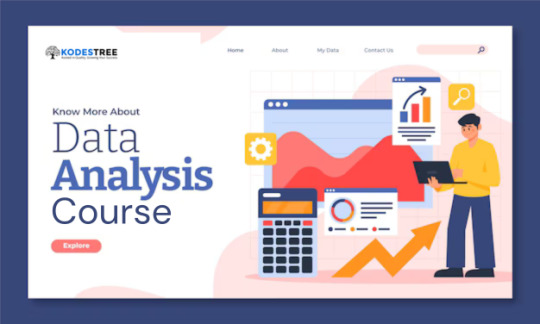
What is Data Science?
Data Science is an interdisciplinary field that uses statistics, machine learning, artificial intelligence, and programming to extract meaningful insights from large datasets. It helps businesses make informed decisions, optimize operations, and predict future trends.
Key Components of Data Science:
Data Collection & Cleaning: Gathering raw data and preparing it for analysis.
Exploratory Data Analysis (EDA): Understanding data patterns and relationships.
Machine Learning: Training algorithms to identify patterns and make predictions.
Data Visualization: Representing data insights using graphs and charts.
Big Data Technologies: Managing large-scale datasets using tools like Hadoop and Spark.
Statistical Analysis: Applying probability and statistics for data interpretation.
Why Learn Data Science?
1. High Demand for Data Professionals
Companies worldwide are leveraging data science to improve efficiency and drive business growth. This has created a massive demand for skilled professionals in various sectors, including finance, healthcare, retail, and IT.
2. Lucrative Career Opportunities
Data science professionals command some of the highest salaries in the industry. A skilled data scientist can earn between ₹5-8 LPA (entry-level), ₹10-15 LPA (mid-level), and over ₹20 LPA (senior-level) in India.
3. Diverse Career Paths
Completing a Data Science Course in Bangalore opens doors to multiple career roles:
Data Scientist – Develops models and analyzes data to solve business problems.
Data Analyst – Focuses on interpreting structured data and creating reports.
Machine Learning Engineer – Builds AI-powered models for automation and prediction.
Business Intelligence Analyst – Transforms raw data into actionable insights.
What to Expect from Data Science Classes in Bangalore?
1. Course Curriculum
A well-structured Data Science Course in Bangalore should cover theoretical knowledge and practical applications. Here are the key topics:
Programming Languages: Python, R, SQL
Data Manipulation & Processing: Pandas, NumPy
Machine Learning Algorithms: Supervised & Unsupervised Learning
Deep Learning & Artificial Intelligence: Neural Networks, TensorFlow, Keras
Big Data Technologies: Hadoop, Spark, Apache Kafka
Statistical Analysis & Probability: Regression, Hypothesis Testing
Data Visualization Tools: Tableau, Power BI, Matplotlib
Real-World Projects & Case Studies: Hands-on experience in solving business problems
2. Course Duration
Depending on your expertise level, you can choose from:
Short-Term Courses (2-3 months): Covers fundamental concepts, suitable for beginners.
Advanced Courses (6-12 months): Provides deeper insights with hands-on projects.
Postgraduate & Certification Programs: Offered by universities and professional institutes.
3. Learning Modes
Bangalore offers various learning modes to suit different preferences:
Classroom Training: Provides hands-on experience and networking opportunities.
Online Learning: Best for working professionals who need flexibility.
Hybrid Learning: A combination of online theory and offline practical sessions.
Best Data Science Classes in Bangalore
If you are looking for the best Data Science Classes in Bangalore, choosing the right institute is crucial. Many institutes offer Data Science Courses in Bangalore, but selecting the right one depends on factors like course content, industry exposure, and placement assistance.
Kodestree provides a comprehensive Data Science Course in Bangalore that covers practical projects, expert mentoring, and placement support to help students secure jobs in leading companies.
Factors to Consider When Choosing a Data Science Course
Comprehensive Curriculum: Ensure that the course covers all essential topics.
Hands-On Training: Real-world projects are crucial for gaining practical experience.
Industry Recognition: Choose an institute with a strong reputation.
Placement Support: Institutes with job assistance increase your hiring chances.
Affordability: Compare course fees and ensure quality training at a reasonable price.
Data Science Course Fees in Bangalore
The cost of Data Science Classes in Bangalore varies based on course duration, mode of learning, and institute reputation. Here is a rough estimate:
Basic Certificate Courses: ₹15,000 - ₹50,000
Advanced Data Science Programs: ₹50,000 - ₹1,50,000
Postgraduate & Master’s Programs: ₹2,00,000 - ₹5,00,000
Kodestree offers a well-structured Data Science Course in Bangalore at an affordable fee, making it accessible to students and professionals looking for a career switch.
Career Opportunities After Completing Data Science Classes in Bangalore
Once you complete a Data Science Course in Bangalore, you can explore various job opportunities in Bangalore’s IT and business ecosystem. Companies across sectors like finance, healthcare, e-commerce, and IT actively hire data science professionals.
Top Career Roles in Data Science:
Data Scientist – Uses machine learning models to analyze large datasets.
Data Analyst – Works with structured data to generate business insights.
Machine Learning Engineer – Develops and deploys AI-based applications.
Business Intelligence Analyst – Helps businesses make data-driven decisions.
Salary Expectations
Entry-Level (0-2 years): ₹5-8 LPA
Mid-Level (3-5 years): ₹10-15 LPA
Senior-Level (5+ years): ₹20+ LPA
Who Should Enroll in Data Science Classes in Bangalore?
Students & Graduates: Those looking to build a career in data science.
IT Professionals: Software engineers and IT experts wanting to upskill.
Business Analysts: Professionals looking to enhance analytical skills.
Entrepreneurs & Startups: Business owners wanting to leverage data science for growth.
Final Thoughts
Bangalore is one of the best cities to pursue a career in data science, with numerous institutes offering specialized training. If you're looking for Data Science Classes in Bangalore, Kodestree provides an industry-relevant Data Science Course in Bangalore with Placement to help students and professionals advance their careers.
Enrolling in a Data Science Course in Bangalore can be the first step toward a high-paying and rewarding career. Choose the right institute, gain hands-on experience, and build a successful future in data science. Start your journey today!
0 notes